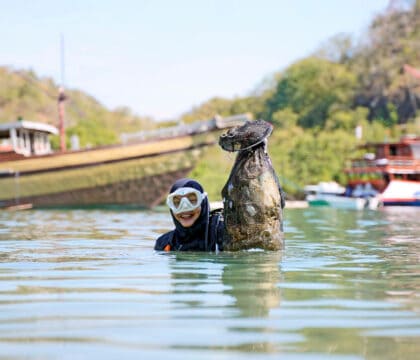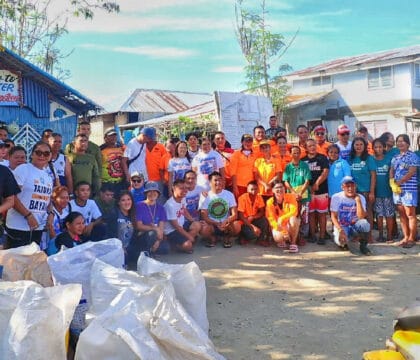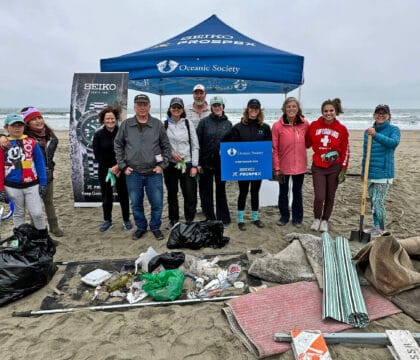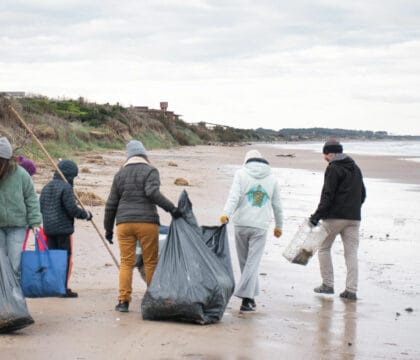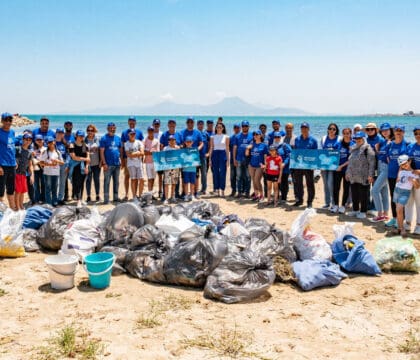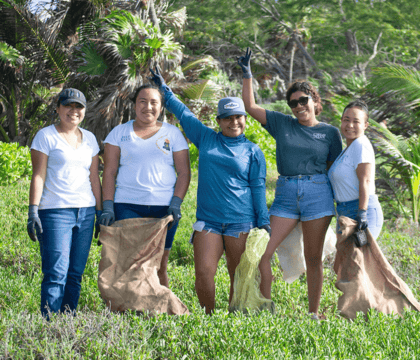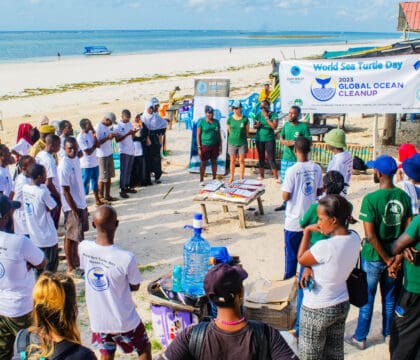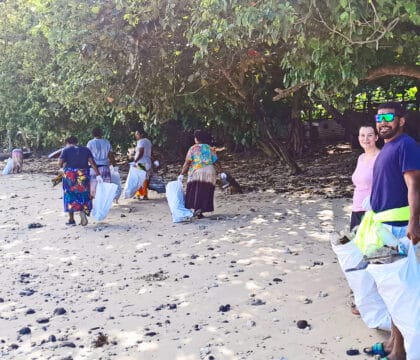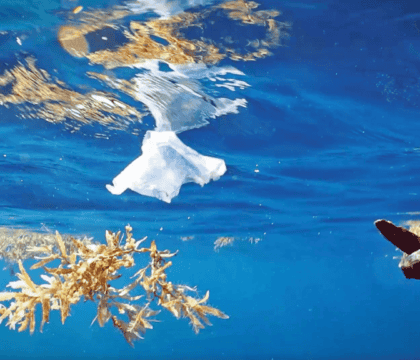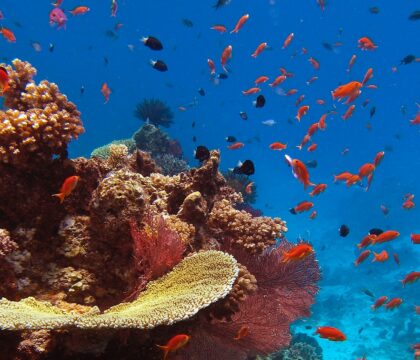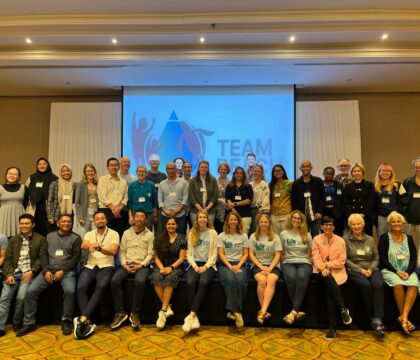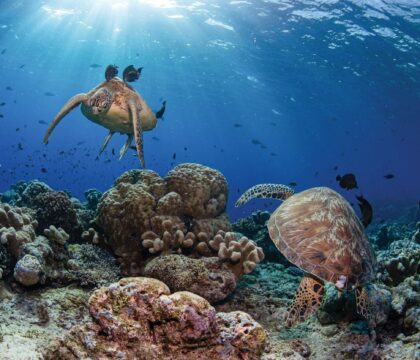July 20, 2023 • News Announcements, Program Updates
From June 8-17, 2023, Oceanic Society joined forces with organizations worldwide to take on the vital task of cleaning up some of Earth’s most important coastal and ocean habitats. This collaboration, led in partnership with Sea Turtle Week and generously sponsored by 5SENS, Planet Oat, and Seiko Prospex, yielded remarkable outcomes. Today, we are thrilled to unveil the results of our 2023 Global Ocean Cleanup.

2023 Global Ocean Cleanup Results
More than 550 volunteers took part in 8 cleanups that were sponsored or led by Oceanic Society in Fiji, Indonesia, Kenya, Mexico, the Philippines, San Francisco (USA), Tunisia, and Uruguay. Together, we successfully removed an impressive 7,449 pounds of trash from important ocean and coastal areas such as sea turtle nesting beaches and feeding grounds, mangrove forests, coral reefs, and coastlines neighboring marine mammal hotspots.
In addition to the cleanups sponsored by Oceanic Society, another 34 cleanups were held worldwide during Sea Turtle Week (June 8-16) as part of the 2023 Global Ocean Cleanup. Collectively, more than 3,100 volunteers removed 88,004 lbs (39,911 kg, or 44 tons) of trash from marine and coastal environments globally.
The cleanups were an integral part of the 2023 Global Ocean Cleanup, a collaborative initiative that brought together organizations, brands, and artists to combat the issue of ocean plastic pollution. In addition to the cleanup activities, participating organizations transformed the marine debris they collected into unique pieces of artwork that were entered into a friendly art competition. This creative approach aimed to inspire audiences worldwide to join the global movement to reduce ocean plastic pollution.

A volunteer with WasteHub collects trash near the shoreline in East Nusa Tenggara, Indonesia. More than 550 volunteers participated in 8 global cleanups sponsored by Oceanic Society. © WasteHub
The 8 cleanups that were sponsored by Oceanic Society reported the following results:
- People and the Sea — Daanbantayan, Cebu, Philippines
- 65 volunteers
- 340 lbs of waste collected
- Most unusual item collected: Television
- Olive Ridley Project — Diani-Chale Marine Reserve, Kwale, Kenya
- 105 volunteers
- 452 lbs of waste collected
- Most unusual item collected: Hair extensions
- Parley for the Oceans — Punta Allen, Sian Kaan, Mexico
- 56 volunteers
- 1,053 lbs of waste collected
- Most unusual item collected: Mattress
- WasteHub — East Nusa Tenggara, Indonesia
- 116 volunteers (including 14 scuba divers)
- 2,012 lbs of waste collected
- Most unusual item collected: Spray cans and paint cans
- Beqa Lagoon Initiative — Rukua and Raviravi villages on Beqa Island, Fiji
- 65 volunteers
- 2,202 lbs of waste collected
- Most unusual item collected: Mattress
- TunSea — Kheireddine Canal, Tunis, Tunisia
- 90 volunteers
- 1,102 lbs of waste collected
- Most unusual item(s) collected: Clothes & electronics
- Karumbé — Cerro Verde, La Coronilla, Uruguay
- 23 volunteers
- 80 lbs of waste collected
- Most unusual item(s) collected: Nasal weaning table for calves
- Oceanic Society — Ocean Beach, San Francisco, California, U.S.A.
- 17 volunteers
- 208 lbs of waste collected
- Most unusual item(s) collected: Rugs
An additional 34 organizations participated in the 2023 Global Ocean Cleanup on a voluntary basis or with support from SEE Turtles. Those organizations reported an additional 2,555 volunteer participants and 80,555 lbs (36,539 kg) of waste collected. Highlights included an astounding 25,353 lbs (11,500 kg) of waste collected by more than 1,500 volunteers with Agbo Zegue in Togo, as well as 13,999 lbs (6,350 kg) of waste collected by 50 volunteers with the Association for Community Awareness (ASCOA) in Cameroon.
Similar to the results of the 2022 Global Ocean Cleanup, food wrappers were the most frequently encountered items across the cleanup sites, closely followed by plastic bottles and caps, plastic bags, and microplastic fragments.
The types of waste encountered varied depending on the location. Our partners in Tunisia, Uruguay, and Kenya reported abundant fishing gear such as buoys, floats, net fragments, ropes, and fishing lines. Meanwhile, Mexico discovered a substantial amount of discarded shoes and flip-flops. Notably, Fiji alone collected over 4,200 beverage cans. In Indonesia, both beach and underwater cleanups were held, resulting in the retrieval of a significant number of food wrappers in each location. Across all the groups, microplastics were a prevalent issue, with thousands of individual pieces collected.
Marine Debris Art Competition
In addition to their cleanups, the seven organizations supported by Oceanic Society created unique artwork using collected waste — see all of their artwork here. The resulting works were reviewed and scored by a panel of judges that included renowned artists and ocean conservationists, as well as an audience choice vote that received more than 3,200 votes. Art contest winners will receive additional support from Oceanic Society, with an additional $1,500 awarded in total.
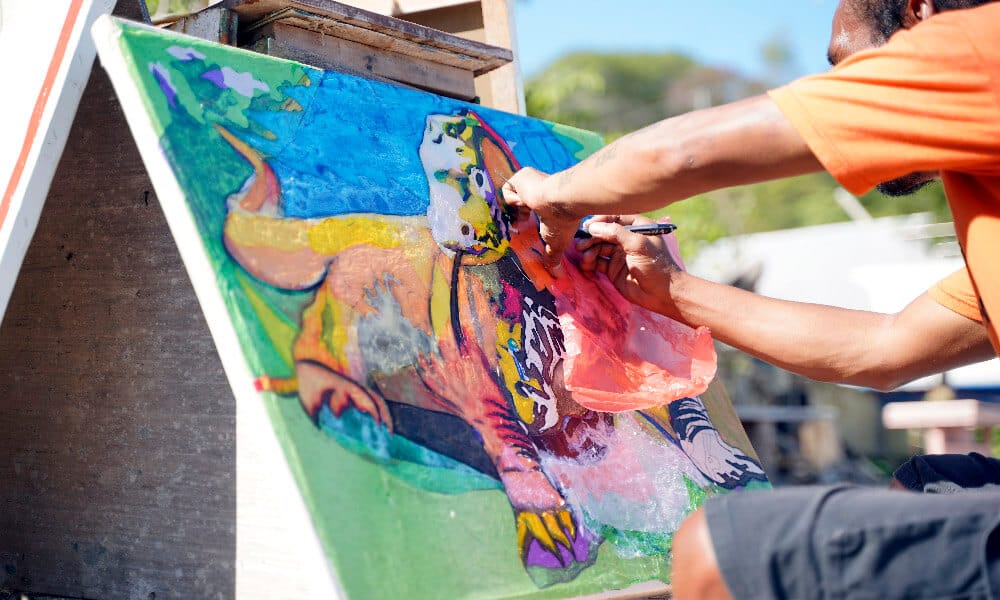
The winner of the Judge’s Choice award was titled “Komodo from Plastic Waste”. The art was created by artist Edy Ginting using waste collected during WasteHub’s underwater and beach cleanups in Komodo and Labuan Bajo, Indonesia.
The art competition results were as follows:
- Judge’s Choice Winner ($500): WasteHub – Indonesia
- Runner-Up ($500): Olive Ridley Project – Kenya
- Audience Choice Winner ($500): TunSea – Tunisia
Cleanup Campaign Sponsors
The 2023 Global Ocean Cleanup was made possible through the generous support of 5 SENS, Seiko Prospex, Planet Oat, our own Expeditions Impact Fund, and private donations.
Support from 5 SENS went towards the global cleanups and digital campaign and was made as part of their commitment to sustainability. 5 SENS is a vegan, cruelty-free, BIPOC-founded fine fragrance company on a mission to capture your mood in a bottle. Learn more about how 5 SENS is giving back.
Seiko Prospex proudly sponsored the Global Ocean Cleanup for the second year in a row. Their support went towards the global cleanups and digital campaign, an educational video series, and the cleanup in San Francisco. Their support is part of a long-term partnership with Oceanic Society that has included sea turtle conservation efforts and coastal cleanups throughout the U.S. and worldwide. Learn more about the Seiko Prospex Mission and Seiko’s commitment to ocean conservation.
Planet Oat also supported the Global Ocean Cleanup for the second consecutive year. Their support went towards the global cleanups and digital campaign and is part of their Planet Oat Project, the brand’s pledge to support organizations that better the world we live in. Oceanic Society has been receiving support from Planet Oat since 2020—learn more here.
About Plastic Pollution & Sea Turtles
Plastic pollution poses a significant and widespread threat to the health of our oceans. Every year, between 4 and 12 million metric tons of plastic make their way into the ocean due to the enormous volume of plastic being produced as well as inadequate recycling and waste management. Unfortunately, this already staggering amount is expected to triple within the next two decades.
The impact of pollution on marine species and habitats is devastating. Sea turtles in particular have become poster children for the impacts of plastic pollution on marine wildlife. While there is still much to be learned about sea turtles and plastic pollution, what we already know is startling: more than half of the world’s sea turtles have eaten plastic in their lifetimes, and scientists estimate that more than 1,000 sea turtles are killed by entanglement in plastic pollution every year.
Thankfully, there are many existing solutions to the plastic pollution problem, and a global movement to fight plastic pollution and clean up our oceans is gaining momentum. Efforts like the Global Ocean Cleanup offer a meaningful way for everyone to actively reduce the amount and impact of plastic in the environment. These efforts not only remove harmful waste and restore the beauty of our coastlines, they also provide valuable insights into the types and sources of waste entering the oceans.
However, while cleanups are essential, they do not address the root causes of ocean plastic pollution, which have to do with the production, demand, use, and improper disposal of single-use plastics. Urgent action is needed from corporations, governments, communities, and individuals alike to tackle this crisis.
Fortunately, the movement to reduce plastic usage has gained widespread recognition and support. People from all walks of life are now acknowledging the urgency of the plastic problem and taking action. Reusable alternatives are becoming the norm, and businesses are adopting sustainable practices in response to consumer demand. Governments and corporations are also stepping up, implementing bans on single-use plastics and investing in eco-friendly packaging solutions. Social media has played a pivotal role in spreading awareness and inspiring change. With the increasing movement to reduce plastic use, we are witnessing a fundamental shift towards a more environmentally conscious society.
Join the Movement to Fight Plastic Pollution
We invite you to join the growing global movement to fight ocean pollution by taking action from home. Here are some resources to get you started:
- Lead a cleanup in your community
- Take our 7-Day Fight Plastic Waste Challenge
- Choose one new action for ocean health
- Explore solutions to ocean plastic pollution
Join us, and be part of the growing Oceanic Society!

